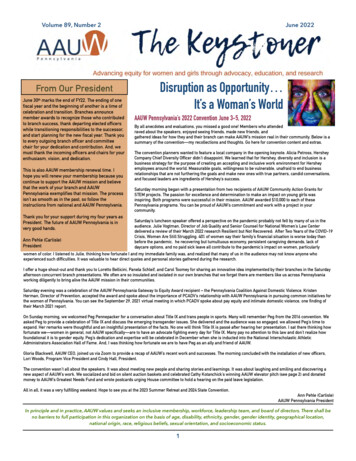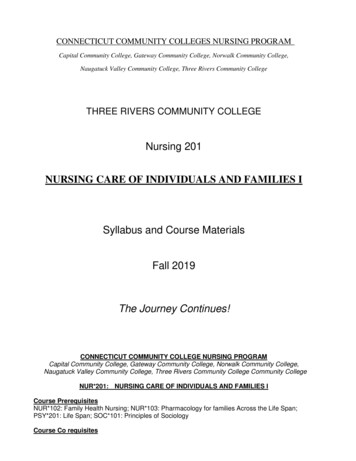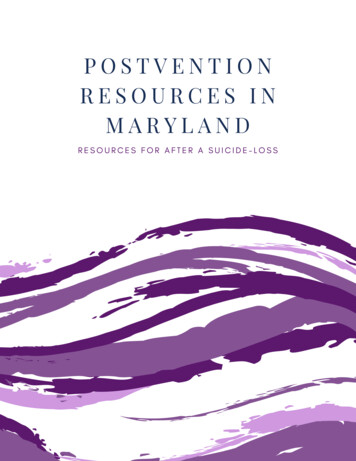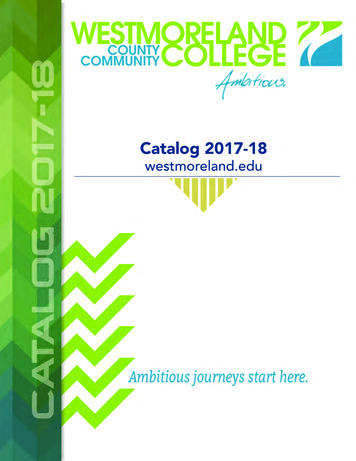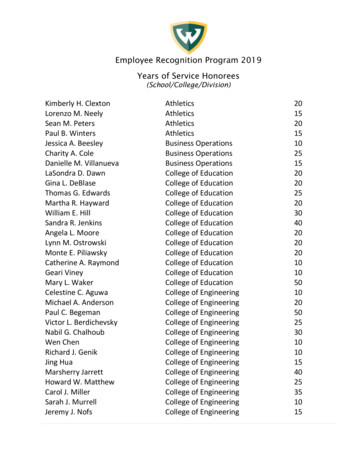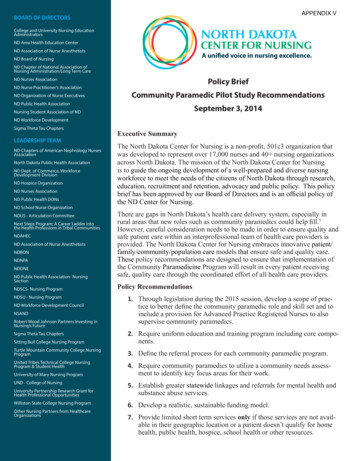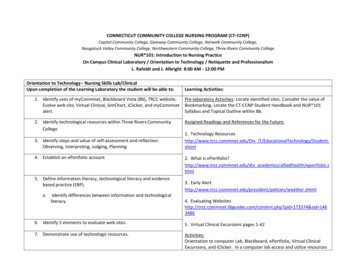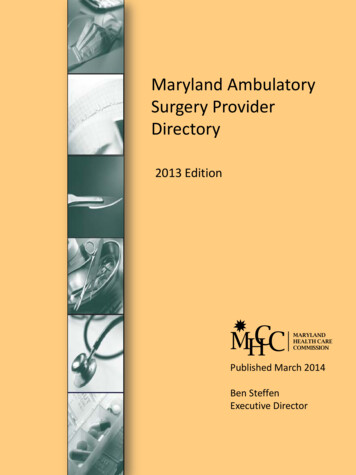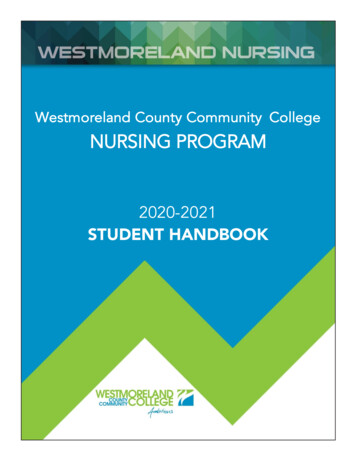
Transcription
Westmoreland County Community CollegeNURSING PROGRAM2020-2021STUDENT HANDBOOK
THIS PAGE INTENTIONALLY LEFT BLANK2020-2021 Westmoreland Nursing Program StudentHandbook2
WESTMORELAND COUNTY COMMUNITY COLLEGENURSING PROGRAMTABLE OF CONTENTSSECTION I: INTRODUCTIONPAGEPurpose . 6Full-Time Faculty and Staff Directory . 7College Phone Numbers . 8Official Academic Calendar . 9General Student Information . 10SECTION II: CURRICULUMPhilosophical Concepts and Definition of Terms . 16Philosophy . 19Purpose and Goals. 20Curriculum Organizing Structure. 21Curriculum Terms . 22End of Program Learning Outcomes (EOPSLOs) . 23Curriculum Progression Definitions . 24Curriculum Progression Maps (EOPSLOs) . .25SECTION III: PROGRAM GUIDELNESAbilities Required in Nursing Courses Guidelines . 30CPR Certification Guideline (Students) . 34Denial of Nursing Licensure Related to Felonious Act Guideline . 35Health Status Guidelines . 36Urine Drug Screen Guidelines . 38Guidelines for Academic Progression . 39Guidelines for Petition to Return to the Nursing Program . 41Petition for Readmission .42Notification of Medical Leave from the Nursing Progam. 43Standards of Student Conduct Guidelines . 44Transfer Procedure Guidelines . 452020-2021 Westmoreland Nursing Program StudentHandbook3
PAGESECTION IV: COURSE GUIDELINESAttendance Guidelines. 48Clinical Laboratory Dress Code Guidelines. 49Course Evaluation Guidelines . 51Clinical Evaluation Guidelines. 53Remedial Plan for Improving Clinical Performance Guidelines . 54Remedial Plan Format and Example . 55Incident Report Guidelines and Form . 56Intravenous Therapy Guidelines . 59Testing Accommodations in the Nursing Program Guidelines . .61Social Media Guidelines . 62SECTION V: SUPPLEMENTAL INFORMATIONGuidelines for Covid-19 Prescreening Responsibility . 64Waiver of Liability Related to COVID-19 (Required) . .65Fall 2020 Special Guideline for Deferred Enrollment . 662020-2021 Westmoreland Nursing Program StudentHandbook4
Section IINTRODUCTION
PURPOSE OF HANDBOOKThe purpose of the Westmoreland Nursing Program Student Handbook is to present general information,guidelines, and policies related specifically to the nursing program. The Westmoreland Nursing ProgramStudent Handbook should be used in conjunction with, and does not duplicate information found in, theWestmoreland County Community College Catalog and Student HandbookStudents are responsible for information contained in the current Westmoreland Nursing Program StudentHandbook, College Catalog and Student Handbook. Nursing students will observe all “Student Rights andResponsibilities” as outlined in the current College Catalog and Student Handbook. Nursing students areencouraged to utilize all “Student Services and Resources” as outlined in the current College Catalog andStudent Handbook.2020-21 Westmoreland Nursing Program Student Handbook6
FULL-TIME NURSING FACULTY AND STAFF DIRECTORYNameLocationPhone NumberTBADean of the School of Health Professions and theSchool of Culinary Arts & Hospitality . CH 2204 .724-925-4028Sue Snyder, MSN, RNDirector of Nursing Program . CH 2258 .724-925-4271Jessica Bartko MSN, RN .CH 2259 .724-925-4009Melinda Belan, DNP, MSN, RN, CLNC .CH 2254 .724-925-4031Heather Blotzer, MSN, RN .CH 2254 .724-925-4272Rebecca Gediminskas, DNP, MSN, RN.CH 2257 .724-925-4170Casey Law, MSN, RN .IND Lab Faculty. 724-357-1404Mary Margaret McIntosh, MSN, RN, CWOCN .Indiana County . 724-357-1404Heather Bolton,Payerchin MSN, RN .CH 2255 .724-925-4021Jonni Pielin-Kircher, MSN RN .CH 2204 .724-925-4164Mary Rodgers, MSN, RN .CH 2253 .724-925-4020Tara Smith, MSN, RN .CH 4010 .724-925-4010Carie Shedlock, MSN, RN .CH 2253 .724-925-4166Donna Steele, MSN RN .CH 2204 . .724-925-5989Barbara Walters, MSN, RN .CH 2259 .724-925-4168Debra Ward, MSN, RN .CH 2256 . .724-925-4022Linda Carr, MSN RN .YWD Lab Faculty .724-925-4000ext. 3066Pam Dzialowski, MSN, RN .YWD Lab Faculty .724-925-4000ext. 3066Carol Denale, MSN, RN.YWD Lab Faculty .724-925-4000ext. 30662020-21 Westmoreland Nursing Program Student Handbook7
COLLEGE PHONE NUMBERSTo contact the college directly, use the following phone numbers. You will reach the switchboard and then youcan be connected with the various offices:If calling from Belle Vernon, Greensburg, Jeannette, Latrobe, New Alexandria,Delmont, or surrounding areas . .724-925-4000If calling from Pittsburgh or surrounding areas .1-800-262-2103If calling from Greene County, Indiana County or surrounding areas .1-800-262-2103Revised: 1/18/2018, 2/16/17, 8/17/2016,7/21/09, 5/19/08, 8/15/07, 8/29/06, 8/02/05, 8/12/02Reviewed: 10/21/2014 , 11/17/152020-21 Westmoreland Nursing Program Student Handbook8
WESTMORELAND COUNTY COMMUNITY COLLEGEOFFICIAL ACADEMIC CALENDAR2020-2021Fall 2020Faculty DevelopmentFaculty Return/Prep DayClasses BeginLabor Day (College Closed)Faculty Development (3-5 p.m.)Faculty Development (No Classes)Thanksgiving Recess (College Closed)Exams or Class Days (Faculty in Attendance)Faculty Prep DayGrades Due in Records OfficeAugust 12,13,August 14August 17September 7Sept 15, Oct.1, Nov. 5, Nov 17October 13November 25, 26, 27, 28, 29December 7, 8, 9, 10, 11, 12December 11December 14 (9 a.m.)Spring 2021Faculty Prep/DevelopmentClasses BeginMartin Luther King Day (College Closed)Faculty Development (3-5 p.m.)Faculty Development (No Classes)Spring Break – (College Closed 4/1-4/4)Exams or Class Days (Faculty in Attendance)Faculty Prep DayCommencementGrades Due in Records officeJanuary 7, 8January 11January 18Jan.28, Feb. 16, Mar 25, Apr. 22March 2March 31, Apr 1, 2, 3, 4May 3, 4, 5, 6, 7, 8May 10May 7May 10 (9 a.m.)Summer 202110-Week Summer Session Classes:Classes BeginMay 24Memorial Day Holiday (Closed)May 31Independence Day (Closed)July 510-Week Session Classes EndJuly 30Grades DueAug 2 (Noon)8-Week Summer Session Classes:Classes BeginJune 7Independence Day Holiday (Closed) July58-Week Session Classes EndJuly 30Grades DueAug 2 (Noon)2020-21 Westmoreland Nursing Program Student HandbookFirst 5-Week Summer Session Classes:Classes BeginMay 24Memorial Day Holiday (Closed)May 31First 5-Week Session Classes End June 25Grades DueJune 28 (Noon)Second 5-Week Summer Session Classes:Classes BeginJune 28Independence Day Holiday (Closed) July 5Second 5-Week Session Classes End Jul 30Grades DueAug 2(Noon)9
GENERAL STUDENT INFORMATIONACADEMIC REMEDIATIONTraditional and technology-based remediation is available for nursing students who are having difficultyacquiring the skills and/or knowledge necessary to succeed in the nursing program. Remediation isdesigned to meet student individual needs and assist them in improving performance in the classroom,campus laboratory, and/or clinical settings.Students may be referred to the remediation laboratory instructors by faculty; or, students can schedulesessions with them independently.ACCREDITATION AND APPROVALWestmoreland County Community College (the College or Westmoreland) is accredited by the Middle StatesAssociation of Colleges and Schools (middlestates.org.). The program is fully approved by the PennsylvaniaState Board of Nursing (ST-NURSE@state.pa.us).The Associate Degree Nursing Program of Westmoreland County Community College (Youngwood Campusand Indiana Education Center) located in Youngwood, Pa. is accredited by the Accrediting Commission forEducation in Nursing (ACEN) ACEN can be reached at 3390 Peachtree Rd. NE, Suite 1400. Atlanta, GA.30326 or by calling 404-975-5000. To obtain full context, refer to www.acenursing.orgADJUSTING EXAMINATION GRADESTest items will be reviewed when 70% or more of the students in the section taking the test have answeredthe question incorrectly. When the instructor determines that an item is valid, the test question will beretained. If the question is determined to be invalid by the instructor, the item will be scored “correct” forall students. If the instructor determines there is more than one correct answer, the student will be givencredit for the correct answers.Students should address inquiries or appeals regarding individual examination grades to the instructorresponsible for teaching the content in question. Inquires or appeals must be submitted within three daysfrom the date the exam was given.AVAILABILITY OF CLINICAL INSTRUCTORAn instructor must be available in the clinical facility when students are providing direct patient care. Thestudent must notify the Nursing Program office (724) 925-4271 and the nurse in charge of the clinical unitwhen an instructor is not available at the time of the clinical experience.2020-21 Westmoreland Nursing Program Student Handbook10
GRADING SCALE FOR NURSING COURSESThe grading scale is as follows:A 90-100B 83-89C 77-82D 70-76F 69 and belowThere will be no rounding of grades, no bonus points, or extra credit awarded within any nursing course.LATE ASSIGNMENTSSubmitting scheduled assignments late demonstrates a lack of professional commitment and may result in areduced grade. Penalties for late assignments will be outlined in the individual course syllabus.Note: Procedure for students arriving late for an exam are at the discretion of the individual instructorteaching the course. Please refer to your course syllabus for information. Extenuating circumstances may beconsidered by the faculty.MISSED EXAMINATIONSA student who anticipates missing a scheduled examination must contact the faculty responsible forpresenting the content prior to the examination to reschedule that exam: An alternate form of the examination may be administered Failure to notify the faculty member prior to the examination and reschedule the missed exam will resultin a grade of zero Failure to take the rescheduled examination at the designated time will result in a grade of zero (0) Students may only miss one (1) examination in any one (1) nursing course Extenuating circumstances may be considered.MOBILE HANDHELD DEVICE/SMART PHONE CLINICAL/CAMPUS LABORATORY USAGEWeb access is listed on the nursing program website (www.westmoreland.edu/nursing)NOTE:Student Responsibilities: Devices need to be fully charged and ready for use at all times. Students will not turn on devices in the class or labs until instructed by faculty. Under no circumstances can the device be used to record conversations or to take pictures or video. If requested, students will show device to faculty or staff members. All tones for devices must be silenced while in class, labs, or clinical. Students will follow all facility policies including turning off phones in clinical setting and movingto approved area to access. Personal phone calls or texting is not permitted during class, labs, and clinical. Students will follow facility policies for disinfecting and cleaning devices upon arrival anddeparture from the clinical setting. It is the student’s responsibility to keep physical possession of the device at all times.Failure to follow this guideline will result in disciplinary action up to and including failure of a course.Date initiated: 1/20/11 Revised:3/15/18Reviewed: 11/17/15, 2/16/20172020-21 Westmoreland Nursing Program Student Handbook11
OBSERVATIONAL EXPERIENCESObservational experiences used to meet clinical objectives/outcomes will have specific guidelinesdistributed with course materialsStudents must be at least 18 years of age at time of first clinical experience.PREPLANNINGPreplanning time is allotted prior to the clinical experience to enable students to gather data related to theassigned patient’s health problem and nursing care. Westmoreland student identification along with appropriate facility identification MUST be worn duringthe preplanning experience. Business-like clothing (no shorts or blue jeans) is to be worn under a cleanand well-pressed lab coat Students are NOT permitted to provide nursing care during the preplanning time.PROFESSIONAL LIABILITYStudents in the Nursing program must obtain professional liability insurance with a minimum coverage of 1,000,000 per occurrence and 6,000,000 aggregate. A copy of the policy must be submitted to Health Professions office prior to the beginning the semester. The policy must be in effect prior to beginning your clinical experience. Failure to provide documentation of required coverage will result in the student not beingpermitted to attend scheduled clinical experiences. The Nursing Service Organization (NSO) offers this type of insurance to students. Go to www.nso.comto apply online.PROGRAM HOURSRefer to the table following the text in this section.REVIEWING EXAMINATIONSPURPOSE: Exam review is necessary in order to provide students with opportunities to reinforce learning,identify concepts requiring more attention and to clarify items that were answered incorrectly.Guidelines: Faculty will provide an opportunity for students to review their exam either in a group setting orindividually. The following provides information and expectations related to the group review process.1. Group review will be conducted during a time frame designated by the instructor. It will occur as soonas possible after an exam after all students have taken the exam.2. All students are encouraged to attend exam reviews but they are not mandatory3. Students may make an appointment to arrange an individual review session. However, the exam canonly be reviewed up to the date of the next exam.4. Prior to a test review, all materials including writing materials and electronic devices must be removed.5. Audio recording is not permitted during a test review.6. At the faculty’s discretion, students may be provided with their individual exams for the review.7. After an exam review, it is the student’s responsibility to return all exam materials to the faculty.8. Professionalism, respect and courtesy is expected during an exam review. If students are notconducting themselves in this manner the exam review will immediately cease.9. Any student who did not earn a 77% or greater in any exam is responsible to make an appointmentwith the faculty to review the exam on an individual basis. This review is in addition to any groupreview.10. All examination reviews must be held before the final class examination is given. If no final examinationis scheduled in the course, the review must be held within one week after the course has ended. beInitiated 05/20192020-21 Westmoreland Nursing Program Student Handbook12
STUDENT RECORDSThe nursing program maintains a record of each student currently enrolled. The stu dent may view thecontents of the record by requesting, in writing, an appointment with the Director of the NursingProgram. The student/graduate must provide written permission to release information from their record.A copy of the waiver is maintained in their record.1. Current student records w i l l include: Current photograph Student data sheet Correspondence related to student Clinical documentation, including evaluation forms, incident reports and/or remedial plans.2. Permanent student records include: Final Westmoreland transcriptSTYLE MANUAL FOR WRITTEN PRESENTATIONSThe most current edition of the Publication Manual of the American Psychological Association (APA) will be onreserve in the library. This manual can also be used as a reference for formal documentation.TAPE RECORDINGPermission to audio tape record a lecture must be obtained from each classroom and laboratory instructor.Audio tape recording should be used for self study use only. You may not reproduce or disseminatethe recording or information in any format. You are not permitted to video the classroom orlaboratorypresentation or utilize any electronic recording devices. Please refer to individual course syllabus for specificguidelines.No taping, recording or copying may occur in any clinical type experience assignment; this includes phones,electronic devices and/or other modes of recording or copying. Failure to abide by this guideline may result indisciplinary action.WITNESSING LEGAL DOCUMENTSStudents are not permitted to act as a witness for the signing of any type of legal document during theclinical lab experience.ELECTRONIC TRANSMISSION OF PLANS OF CAREIn order to protect patient confidentiality the following precautions will be taken whenever plans of careor simulated charting are electronically transmitted between student and clinical instructor: Client's initials, DOB or room number will not be included on any forms of electronic communication. If initials are required then the student will place their initial in the designated place. The client's age will be included on all electronic f o r ms .Dates Revised: 2/16/2017, 11/14/ 2012, 4/16/09, 5/19/08, 6/23/07Dates Reviewed: 6/5/07, 4/7/11, 10/21/14,11/17/15, 1/18/2018,3/15/2018Next Date to Review: Fall 2020 (every 3 years)Responsibility: Guideline/By-laws Committee2020-21 Westmoreland Nursing Program Student Handbook13
THIS PAGE INTENTIONALLY LEFT BLANK2020-21 Westmoreland Nursing Program Student Handbook14
Section IICURRICULUM
PHILOSOPHICAL CONCEPTSDEFINITION OF TERMSCRITICAL ELEMENTS:The five critical elements (5 C’s) are the essential attributes that the faculty believe all nursing graduates ofthe Westmoreland Nursing Program need to practice nursing. They provide the organizing framework of thecurriculum and serve to facilitate the attainment of the knowledge, skills and behaviors necessary to providenursing care for individuals with basic human needs and/or alterations in basic human needs.The 5 C's arecaring, competency, communication, critical thinking and commitment. The definition of each criticalelement is as follows:CARING – Caring creates an environment of being available for individuals and families beyond justdoing for them. It compels the nurse to seek and apply evidence from the sciences to act for or withindividuals based on a respect for the uniqueness and needs of each individual. The nurse also mustprovide patient- centered teaching and health education to meet the learning needs of individuals andgroups in order to promote health and prevent disease.COMPETENCY – The safe and skillful performance of technical and/or management skills with minimumexpenditure of time, effort, and resources.Technical skills – Interventions, actions, techniques, or procedures necessary to implement the planof care.Management skills – Techniques, strategies, and tactics used when managing care for a group ofpatients.COMMUNICATIONS – A two-way process of sending and receiving messages. Skills associated withcommunication are verbal (spoken, written, or electronic) and non-verbal, both of which are influencedby sociological, physiological, psychological cultural, and environmental factors. These skills arenecessary to initiate and maintain care of individuals and their families. Communication with patient,family, and health care team members is clear, concise, correct, and complete.Therapeutic Communication – Facilitative and leads the patient and the nurse to greaterunderstanding of patient behaviors and behavior alternatives. These are goal-directed skills that thenurse uses to provide the individual and family with the opportunity to identify and explore needsand/or problems, discover healthy ways of meeting basic needs; integrate new knowledge andskills, experience satisfying interpersonal relationships; and achieve the optimum level of healthand wellness. These skills are aimed at preserving respect and fostering growth of patients andfamilies.Collaborative Communication – The foundation of effective teamwork. It requires verbal (spoken,written, or electronic) and non-verbal skills necessary for interacting, planning, decision making,problem solving, and goal setting with health team members to achieve positive patient centeredoutcomes. This is essential for fostering continuity of care and maintaining a culture of safety.CLINICAL JUDGEMENT – The knowledge-based, goal-directed process of gathering, analyzing, andsynthesizing data to make decisions and formulate judgments in the provision and management of patientcare. The nurse uses an objective scientific problem solving process in a context of cultural, clinical, andindividual variables to provide and manage care and to promote health for patients and families. Theoutcomes include safe effective care that meets the psychosocial and physiologic needs of the patient andfamily.COMMITMENT – A pledge to understand and adhere to standards of professional nursing practice andto abide by the Westmoreland Nursing Program, Student Handbook, and Agency Standards. It is2020-2021 Westmoreland Nursing Program StudentHandbook16
essential to commit to upholding legal and ethical codes of professional nursing practice and to activelifelong learning to develop professional identity and on-going professional growth.The Westmoreland Nursing Program is aligned to the QSEN (Quality and Safety Education in Nursing)competencies to ensure care is provided within the legal and ethical framework of safe nursing practice.BASIC HUMAN NEEDS: Needs that are present across the life span that may be satisfied or altered asrelated to health or illness. Within our curriculum, these needs are categorized as physiological (oxygenation,nutrition/elimination, and activity/rest), safety/security, psychosocial/sexual, self-esteem, and selfactualization. Basic human needs and alterations in basic human needs provide the structure for organizingcommon health problems and related nursing care well-being within clinical nursing courses.EVIDENCE BASED PRACTICE: A science-to-practice model of the use of critical thinking to apply researchbased and practice-based evidence to deliver quality, safe, and cost-sensitive care. It is based on practiceguidelines and standards of care, as well as patient and family values and expectations.HEALTH: A dynamic state of well-being characterized by a physical, mental, and social potential, whichsatisfies the demands of a life commensurate with age, culture, and personal responsibility.Illness: A condition related to an alteration in the satisfaction of basic human needs.INDIVIDUAL: Man, woman, child or infant who has an essential need for care to satisfy basic human needsacross the life span. Needs may be satisfied or altered and can be related to health and illness. Individualspossess unique values and beliefs that influence their choices in relation to their health.Family: A system of relationships where members share activities, are emotionally involved with eachother, and who usually live together or in close geographic proximity. Members are committed to thewell- being of the family and share a past, present, and future. A family is defined by its members.NURSING: A dynamic and evolving evidence-based practice profession that requires specialized scientificknowledge, skills, and behaviors. Nursing is the process of diagnosing and treating of actual or potentialproblems in meeting basic human needs of patients and their families. Nursing is based on five criticalelements: caring, competency, communication, critical thinking, and commitment.NURSING EDUCATION: Process that promotes the attainment of the knowledge, skills, attitudes, and safebehaviors needed to fulfill the roles of the nurse.LearningAn active process of acquiring new knowledge, behaviors, and skills that results in a measurable changeof behavior and achievement of learning outcomes.StudentAn individual committed to learning and growth who seeks to achieve the program/graduate outcomesof the nursing program.FacultyAcademically and professionally qualified individuals who provide an environment that is conducive tostudent achievement of program outcomes. Faculty function as role models and resource persons who2020-2021 Westmoreland Nursing Program StudentHandbook17
assess, plan, organize, implement, facilitate and validate student learning experiences. They also evaluatestudent progress toward end of program student outcomes. Faculty maintain expertise related to theirteaching responsibilities.Associate Degree Nursing EducationEnables the student to become a caring, competent, and committed professional nurse who can thinkcritically, and communicate effectively and therapeutically in providing care. At the conclusion of theprogram, the student is granted an Associate in Applied Science Degree (AAS) and is eligible to applyfor licensure as a Registered Nurse.Associate Degree Nursing GraduateAn individual prepared to assume the role of the professional nurse in a variety of health care settings. Agraduate of this program is eligible to apply for licensure as a Registered Nurse.2020-2021 Westmoreland Nursing Program StudentHandbook18
PHILOSOPHYThe faculty believes that a dynamic relationship exists between the individual and society, and that individualshave the ability and the right to make choices in all aspects of their lives including their health. The facultybelieves that individuals are unique beings that have human needs across the life span and possess uniquevalues and beliefs that influence their choices in relation to their health and well-being.The faculty believes that an individual’s definition of health is subjective and is influenced by one’s culturaland societal experience. Definitions of health may include a sense of well-being, the ability to perform rolefunctions, and a dynamic inter-play
2020-21 Westmoreland Nursing Program Student Handbook 11 GRADING SCALE FOR NURSING COURSES The grading scale is as follows: A 90-100 B 83-89 C 77-82 D 70-76 F 69 and below There will be no rounding of grades, no bonus points, or extra credit awarded within any nursing course. LATE ASSIGNMENTS
